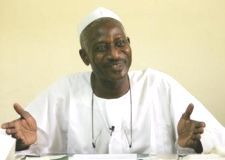Rebellion, not election, occupies troubled Chad
April 21, 2006 (N’DJAMENA) — Chad shows little sign of being in the middle of a presidential campaign, though the vote is less than two weeks away. No television or radio ads. Few posters or banners.

President Idriss Deby, who is seeking a third term, faces little opposition — and hasn’t been known for allowing much since he took power by force in 1990. And he is distracted by a rebellion in a country where power has usually been won by the bullet, not the ballot.
The main opposition alliance, which has boycotted the election because it believes it will be rigged, thinks the poll may not be held as scheduled May 3 because of clashes between rebel and loyalist forces.
Political scientist Roland Marchal said Deby’s biggest worry is the rebellion made of different groups that reportedly have rear bases in neighboring Sudan.
A week ago, the rebels managed to get from bases far to the east to the capital; their attack was repelled in fighting that, according to government figures, killed at least 350.
An African Union team arriving in Chad Friday to assess the central African country’s claims that Sudan was behind the April 13 rebel attack on the capital, N’djamena.
While Deby repeatedly points the finger at Sudan, some of the leading rebels are not only Chadian, they are family. In February, two generals who are relatives of Deby joined the rebels. Two of the president’s nephews who were responsible for the country’s oil program also have joined the opposition.
There are plenty of reasons for citizens to differ with Deby’s stewardship of a country blighted by corruption and, despite newfound oil wealth, poverty. But the rebellion seems to be at heart a struggle for power.
Deby, who has survived several coup attempts in his 16 years as head of state, said that the April 13 attack was not the work of rebels, but Sudanese mercenaries hired by Sudan’s President Omar al-Bashir’s government to overthrow him and create instability in central Africa.
Sudan has denied Deby’s accusations, and counters with accusations Chad harbors Sudanese rebels that have fought a 38-month conflict in Sudan’s Darfur region that borders Chad.
Many of the Darfur rebels and Chadian rebels are from the same tribe, the Zaghawa, who found themselves in different countries when colonialists drew borders in the late 1800s and early 1900s. Some of Deby’s domestic problems stem from a sense among some in Chad he has done too little to help Sudan’s Zaghawa.
The Darfur fighting has seen tens of thousands of people killed, over 2 million made homeless in Sudan and another 200,000 fleeing to Chad.
Deby and al-Bashir need to sit face-to-face and resolve the Darfur crisis and the eastern Chad rebellion, said Kamougue Wadal Abdelkader, an opposition leader who served as vice president in the 1970s.
“They are the ones who started the troubles in Darfur,” Abdelkader said.
Deby said on Tuesday that calls to postpone the elections will lead to a constitutional vacuum that could be “dangerous.” He also said that by boycotting the elections, opposition parties had allied themselves with the rebels.
“If we don’t have elections, anything can happen — even civil war,” Deby told journalists.
The alliance of 19 opposition parties, the Coordination of Political Parties for the Defense of the Constitution, has boycotted the presidential election, saying Deby has repeatedly ignored calls for electoral reform.
Some observers think that in a fair race, the combined vote for opposition presidential candidates would outweigh support for Deby, but that no opposition candidate is popular enough to carry the vote alone.
Ibni Oumar Mahamat Saleh, the alliance’s spokesman, said the May 3 vote is “Deby against himself.”
Saleh, who said that the alliance condemned any attempt to take power by force, said it was not only eastern Chad that harbored rebel groups. There are some in the north and at least one in the south, Saleh said.
The day after the elections, “there will be a widespread war. In fact, I do not know whether the elections will take place. That is a real risk,” Saleh said.
(ST/AP)
